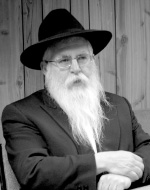When a person dies, he is free from Mitzvos – specifically a regular person, but this is not so regarding tzaddikim, who are called “alive” even posthumously. And of course this is not so of Yaakov Avinu, who “did not die”; it is certain that he is obligated in Mitzvos. * But how can tzaddikim fulfill Mitzvos, such as eating matza and the like, in the actual, real sense?! * Source materials compiled by Rabbi Shloma Majeski. Translations are in bold.
Translated and presented by Boruch Merkur
 The Klausenberger Rebbe discusses the obligation of tzaddikim to fulfill Mitzvos after they are nistalek, for as we have seen “Tzaddikim [even] in their death are called alive.” Here is a selection regarding the Gemara’s statement, “Yaakov Avinu did not die,” that appears on pg. 19 of Yisroel Saba.
The Klausenberger Rebbe discusses the obligation of tzaddikim to fulfill Mitzvos after they are nistalek, for as we have seen “Tzaddikim [even] in their death are called alive.” Here is a selection regarding the Gemara’s statement, “Yaakov Avinu did not die,” that appears on pg. 19 of Yisroel Saba.
The Gemara’s teaching that “Yaakov Avinu did not die” requires clarification, for [if it is to be understood in the literal sense] Yaakov would be obligated to observe all of the Mitzvos! How then would he consume a k’zayis of matza [on Pesach], etc.?
Indeed, in Tractate K’suvos 103a it says that after his passing, Rebbi would visit his home every Shabbos evening. And the commentary on this Gemara found in Seifer Chassidim siman 1129 concludes by saying: Rebbi would [make Kiddush and thereby] discharge others of their obligation of making Kiddush on Shabbos. Other people when deceased are free from the obligation of Mitzvos, but Rebbi was like a living person, who [even] wore clothing as he did when alive. Indeed, “the righteous [even] in their death are called alive,” [and, therefore, Rebbi remained obligated in Mitzvos] and [even had the capacity to] discharge members of his household of their obligation to make Kiddush. See the discussion there.
What emerges from the above is that tzaddikim remain obligated in Mitzvos even after their passing.
Also the Chida writes: When a person dies, he is free from the obligation of Mitzvos – specifically a regular person, but this is not so regarding tzaddikim, who are called “alive” even posthumously. And of course this is not so of Yaakov Avinu, regarding whom the Gemara teaches that he “did not die”; it is certain that he is obligated in Mitzvos.
But how can he fulfill them? […] How can tzaddikim fulfill Mitzvos, such as eating matza and the like, in the actual, real sense?
Surely G-d’s reach does not fall short. G-d, Creator of all existence, is able to fashion the means whereby tzaddikim are able to eat even after their deaths, in order that they may fulfill the Mitzva of eating matza, albeit that this concept is beyond our comprehension and grasp. It is reminiscent of how the angels, when they visited Avrohom Avinu, literally ate [the food they were served], as written in Tikkunei D’Vei Eliyahu, cited in Tosafos Bava Metzia 86b: the fact that they were able to eat was a manifestation of G-dly power [a miracle from G-d].